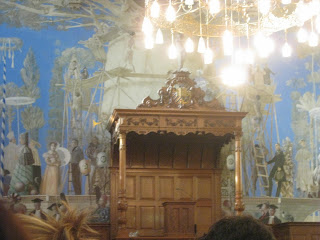We decided to go to Amsterdam and, going to Amsterdam pretty much means that you have to visit the place where Anne Frank and her family went into hiding during WWI.
The day was really fun overall and we did a lot of sight-seeing and went to some other museums, but the part of the trip that was the most significant to me was visiting Anne Frank's house. You're not allowed to take pictures in the house, so I don't have any to show, but it wouldn't really do the place justice anyway. Like almost all pictures, they would not be able to show what the place was really like or the claustrophobic feeling that you get when walking through.
I read Anne Frank’s diary when I was in 4th grade and wish I would have read it again more recently. The thing that is really amazing to me about her diary is how, for being so young, perceptive she was of all that was going on around her. I mean, you obviously cannot ignore the fact that your country has been taken over by Nazis, but her observations of the world around her and how she interpreted everything makes her seem older than she is in her diary. Then the next section she’d start to sound like a kid again when she described something else. There was a video of Anne’s dad, Otto, who was the only family member and person in the hiding space to survive the concentration camps and he was talking about what it was like to read Anne’s diary. One of his quotes was “For me, it was a revelation. There, was revealed a completely different Anne to the child that I had lost. I had no idea of the depths of her thoughts and feelings.” Here’s the interview…
Otto Frank had decided that he didn’t want the furniture to stay in the annex where he, his family, and his friend hid for two years until somebody unknown gave a tip that exposed their hiding spot. So the apartment didn’t have any furniture but there were tons of pictures, models and quotes to see.
The most lasting impression I have is realizing how tiny and dark the hiding place was. There were eight people living there and they couldn’t even open the blinds and had to move around as little as possible during the day so as not to expose their position. The rooms were dark and felt so isolated from all that was going on in the city.
The pictures that Anne had hung up in her bedroom were still there and there were markings on the wall where her parent had kept track of how much Anne and her older sister Margot had grown since they went into hiding. That part was really sad because it not only showed how young these girls were that were going through such a tough experience, but it was also a reminder of how they never grew up any more than that because they were forced into a concentration camp.
There was another video playing that was really sad. It was an interview with a childhood friend of Anne’s who say her across the fence at the concentration camp a few days before Anne died, which was just a few days before the liberation of the camp. The friend had said that if Anne had known that her father was still alive, she might have made it until the end of the war and she was freed.
Anne had said that she wanted to be a writer when she grew up and that she wanted her diary to be published as a sort of novel detailing the experience of Jews during the WWII era. It’s strange to think that, even though Anne didn’t live to see her 16th birthday, she lives forever through the words of her diary that has been translated into over 60 different languages. The line to get into the house was about an hour long, and I’ve been told that it’s always that way. Anne Frank has really touched millions of people and has authored one of the best-known documentations of the human experience in WWII. As Otto Frank said:
“We cannot change what happened anymore. The only thing we can do is to learn from the past and to realize what discrimination and persecution of innocent people means. I believe that it’s everyone’s responsibility to fight prejudice.”



















